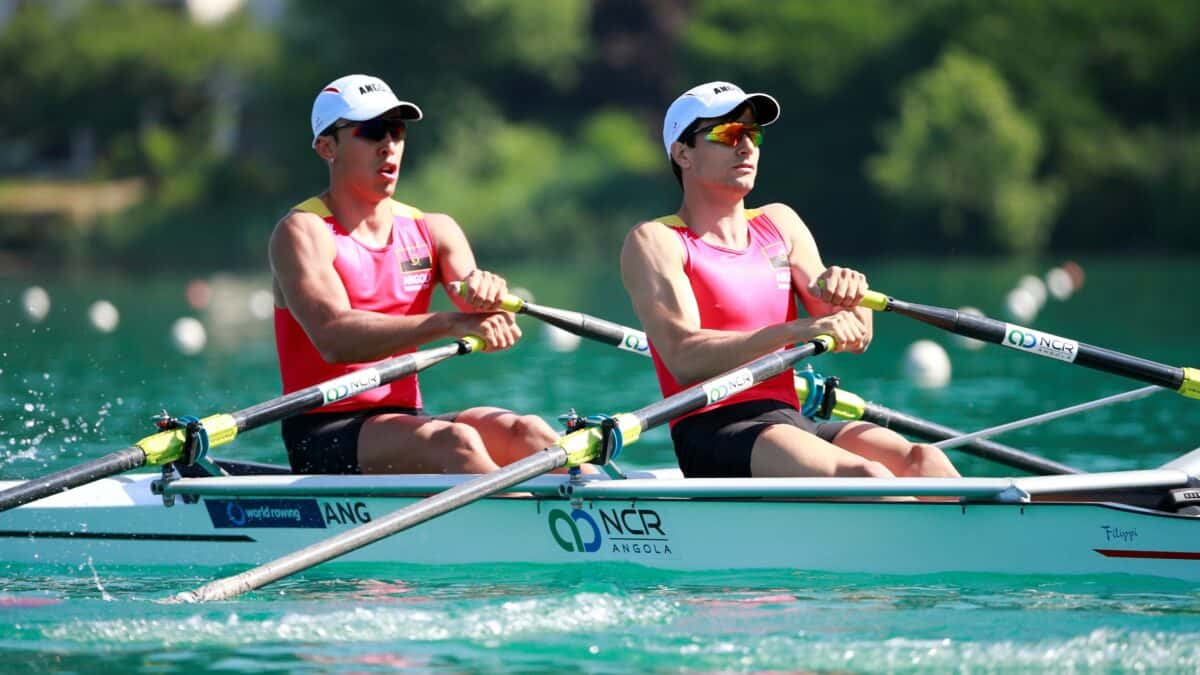
08 Aug 2016
Rowing's second chance repechage for Angola
Rowing is one of a small number of sports that uses the repechage as part of the progression system to the final. Coming from the French word, it literally means ‘fishing out’. The idea is that you take the best fish from the pool and then you go back to get the next best.
For Angola’s Matias and Rasamoeline, after placing out of the qualifying spots in their heat, they will return to contest the repechage. The duo will race in this second round of competition on Tuesday 9 August at the Lagoa de Freitas Lagoon and keep their Olympic racing hopes alive.
Matias and Rasamoelina talked to World Rowing about their path from a nation that has just a handful of rowers to becoming the first Olympic rowers for their country.
“I was the first Angolan to represent Angola in rowing. It was in 2007 at the All African Games. I then went to school in the United States and in 2009 I went to the World Rowing Under 23 Championships. That was the first time I went to a World Rowing event. That is where it all started,” says Matias.
Matias then started his first Olympic cycle in 2010 when he teamed up with another Angolan, who was very experienced. “We tried to qualify for the London Olympic Games. That didn’t happen unfortunately because I had hip surgery on my left hip. I then got back into rowing, but had to have hip surgery on my right hip. I was out for a year, learning to walk, rebuilding the muscles.”
In 2013 Matias started a new Olympic project with his friend Jean-Luc Rasamoeline. Matias and Rasamoeline have known each other since they were three and they started out as swimming together. Matias convinced Rasamoeline to make their goal the Rio Olympics.
Matias started sculling in the early days of Angolan rowing. “We had some left over wooden boats and sculls from the Portuguese. The Ministry of Sport decided to send me to the All African Games. I played some other sports before, but rowing was the sport that fit for me.”
As lightweight rowers, a double and a four are the only Olympic boats so once teamed up with Rasamoeline the duo started to train for Olympic qualification. “We made a lot of progress, but it was really tough. We’ve lost (races) many, many times. And a lot of times, by a lot. But we always kept going and believed in ourselves. We never backed off. The pivotal moment was last year because we started working with Phil (British coach Phil Rawley). He is a tough coach, but he is a good coach,” says Matias.
“There are obviously big disparities. It is not easy coming from less developed nations, the level internationally is so high. But we’ve closed the gap. Time after time. Even internally in Angola what we’ve done is important. When I started, we didn’t have any boats. Now we have a fleet, we have other Angolan rowers. We show up to the African Championships with other teammates. We medal there and it is inspiring. It is important for us, but it is really special that our country can be represented in rowing.”
The duo qualified for Rio through the African Continental Olympic Qualification Regatta and say there is now some recognition for rowing in Angola. “There has been a real effort in Angola to develop the sport and a lot of the kids are inspired,” says Matias. “The kids are very motivated to see some of these sports go to the Olympics. People are really starting to believe in what we’re doing. It doesn’t stop here.”
Much of the duo’s training and preparation has been done in Europe. Back in Angola rowing is done on the Bay of Rwanda and Matias describes the small group of local rowers as being very passionate. “These kids, some of them show up to practice on an empty stomach and the club gives them something to eat after training. Rowing is a world of possibility for a lot of these future athletes.”
Matias’s other hope for the future is for a World Cup to come to Africa. “I think South Africa would be a great place to host a World Cup. I believe it will happen.
“We see that the sport is growing on our continent. You see the scullers of Algeria and Tunisia doing really well at the World level and it is inspiring,” says Matias. “People don’t always realise that we just don’t have the same conditions.
Angola will race at 11.40am (Rio time) on Tuesday 9 August 2016.

